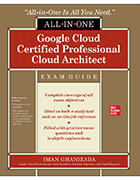Tips to prepare for Google Cloud Architect certification
Author of 'Google Cloud Certified Professional Cloud Architect All-in-One Exam Guide' Iman Ghanizada explains how to approach the cloud architect certification and role in this Q&A.
IT professionals can add to their skill sets and advance their careers through cloud certifications. For those pursuing cloud architect roles, the Google Cloud Certified Professional Cloud Architect is one certification path to consider.
This professional-level certification assesses a candidate's abilities to design and plan cloud architecture, manage and provision infrastructure, design for security and compliance, analyze technical and business requirements and demonstrate other responsibilities of a Google cloud architect.
Iman Ghanizada, a security solutions manager at Google Cloud, outlines key concepts, exam tips and resources to help pass this certification in his book Google Cloud Certified Professional Cloud Architect All-in-One Exam Guide. Ghanizada's book digests the technology you need to know and explains the broader responsibilities of IT professionals in the cloud architect role.
In this Q&A, Ghanizada discusses ways to approach the Google Cloud Certified Professional Cloud Architect exam and other insights for hopeful cloud architects. Follow along with the chapter excerpt below for more information on important topics covered by this certification.
This transcript has been edited for length and clarity.
Which IT professionals should consider this certification? Where should they be in their careers when preparing for the Google Cloud Certified Professional Cloud Architect exam?
Folks who are new in the field and others who are senior in the field are reading the book. This exam guide is both for the people who are pursuing the Google Cloud certification and also those who are already certified -- or not interested in being certified -- but want to get an idea of best practices of doing enterprise cloud architecture directly from someone from Google who is in the field.
Do they need experience with Google Cloud?
It depends on your intentions. You can use this book to give you an idea of how cloud architecture works from a high-level perspective and introductory overview of Google Cloud. You can also leverage the book to pursue the certification and dive into the technical, nitty gritty aspects. Or you can use it to pursue best practices of someone in the field who does this for a living.
Typically, for Google Cloud Professional Cloud Architect, the certification prerequisites are geared toward people with five years of experience in a similar profession in IT.
In your introduction, you mention that in addition to the technology side, cloud architects need to understand the business side of things. Why is it so important to have a mix of the two?
Usually when you're doing engineering or operations work, you're focused on solving tasks. When you step into architecture, the scope of your work is focused on building highly available, scalable systems that can serve all of your users. Your users could be billions of people accessing Snapchat, for example, or it could be hundreds of internal users accessing a highly sophisticated database.
You have to understand the business drivers of the architecture you intend to design and the problem you're trying to solve. That funnels into how you can build a highly resilient, scalable architecture that is cost efficient, serves its purpose and is designed to scale for any future iterations of the business's objectives, products and features.
You say that people who prepare for the Google Cloud Professional Cloud Architect exam need to shift their mindset to thinking like an architect. Can you highlight some best practices for making that shift?
[The designers of] the Cloud Architect certification aren't just looking for someone who has the engineering know-how to solve problems. Of course, that's a big element of it. But when you have the architect mindset, you need to think of the key strategic factors -- the business objectives and the technical requirements.
When you're solving these problems, you need the mindset that you're actually building something, rather than just solving an operational issue. If you go for the Associate Cloud Engineer certification instead, the mindset is totally different. That mindset is going to be about the key operational issues that you have to troubleshoot and solve. Whereas, as an architect, you are designing and creating systems.
Read an excerpt from the book
Take a closer look at Google Cloud networking components you need to know for this certification with the full chapter excerpt from Google Cloud Certified Professional Cloud Architect All-in-One Exam Guide.
Can you describe the methodology and study strategies you recommend when assessing the questions on this exam?
You have to be efficient with your time and highly effective with the way you solve problems on the exam. One strategy that I recommend is to run through and try to answer everything you can immediately, within a minute or 30 seconds. If you can answer it, do it and if not, flag it and go onto the next one.
Within each question, there's a big element of reading comprehension and reverse engineering the answers. First, as you parse through the questions, identify all the key words they are looking for. Is the question looking for a cost-effective solution? Is it looking for a secure solution? Consider the different business and technical requirements that that question is asking for. Then, when you go into the answers, see if you can identify any patterns to reverse engineer the answer.
Sometimes, multiple answers will be right but one of them will be the most optimal. For example, one of them may be the most cost efficient and that may be what the question is asking for. I consider studying for the exam to be 75% of the test but these test taking strategies are the other 25%. That's going to be the X-factor in passing.
You highlight various Google Cloud concepts throughout the book that will be on the exam such as networking, security, compute and containers. Which topic is the most challenging for people learning these concepts?
Networking, in my opinion. Once you get into the networking chapter, that's when it kicks off in terms of technical depth. And that's really the core foundation of cloud computing. Networking is the topic I covered most thoroughly in the book. It's the one I spent the most time writing because I wanted to take something that is incredibly complex and simplify it for the audience.









